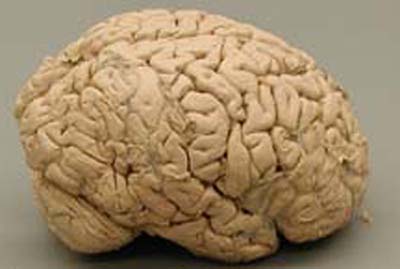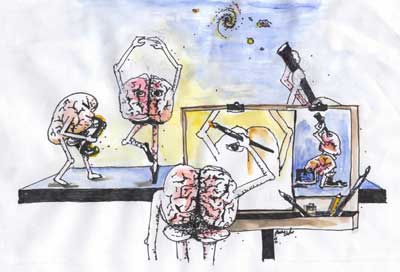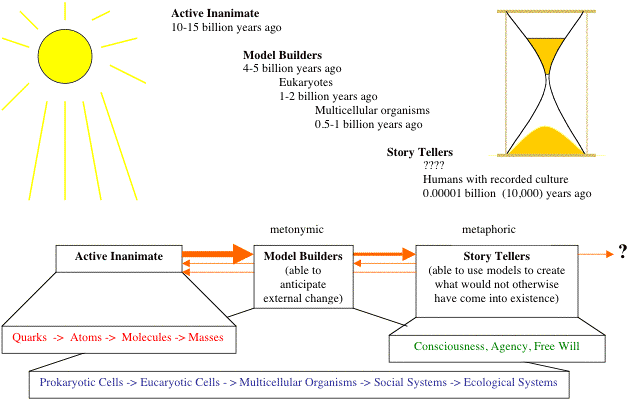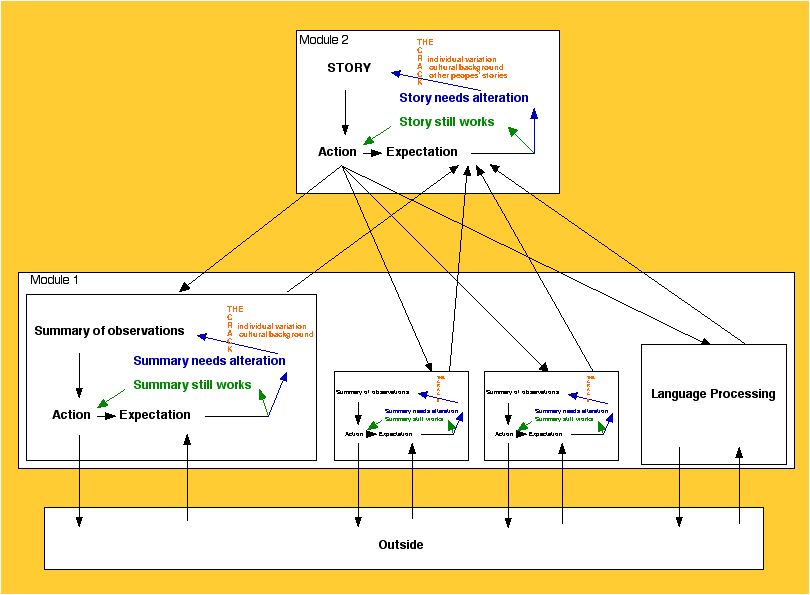Serendip is an independent site partnering with faculty at multiple colleges and universities around the world. Happy exploring!
Emergence, 2009 - Intro
Emergence
Biology 361 = Computer Science 361
Bryn Mawr College, Spring 2009

|

|

|

|

|
Motivations

|
- Similar patterns/properties exist in systems at quite different scales and having quite different constituents
- It frequently proves difficult to account for the patterns/properties of systems in terms of the properties of the individual constituents alone
- Many systems seem to display patterns/properties despite significant disturbance of individual constituents
- Many systems display variations in patterns/properties in lieu of external causes (cf traffic jams) or internal directors (cf slime molds and flocking). The search for either may lead one down blind research alleys.
- Many seems seem, on exploration, to be more complex than they "need to be"
- It also seems difficult to account for systems in lieu of a designer, but accounting for them that way leads to an infinite regress in explanation (and may lead one down blind research alleys).

|
| John Conway's "Game of Life" |
- Distributed systems, interactions as critical as component properties, and frequently bidirectional
- No "conductor" nor other external director (see Game of Life)
- No "architect" nor other external designer (see Game of Life)
- Self organization
- Even simple distributed systems may require simulation to determine what properties they will exhibit
- Randomness may play an important role in both exhibited properties and in the evolution of systems
- Computer modelling as a new microscope/telescope, allowing one to see things impossible to see otherwise

|
|
|
Potentials
- A broader perspective that opens new directions for exploration of particular systems and system phenomena that have proved difficult to make sense of previously
- A broader perspective that integrates understandings of a wide variety of phenomena
- A new set of "rules" that apply generally across a wide variety of phenomena at all scales
- Demonstrated in particular cases but still need to better define the broader perspective, add to cases, explore limits
- Difficulty in understanding how to go from one level of organization to another, particularly inanimate to animate and animate to conscious
- A few likely cases, but remains to see whether broadly so
- Human activity emergent or beyond emergent?
27 January
Introduction to computer models/modelling as inquiry
"Simple things interacting in simple ways can yield surprisingly complex outcomes"
Therefore, one get study/learn from computer models just like one can study/learn from "natural" phenomena
Game of Life as an example. Understandings from it
- Simple interactions among simple things in lieu of a conductor (fully distributed systems) can create order (non-randomness)
- Simple interactions among simple things can create kinds of order unanticipated by an architect/designer
- ?????
What other understandings/new questions can we obtain from the Game of Life? Play with it and let's find out ...
- Numbers/kinds of stable forms?
- Dependence of stable forms on starting conditions?
- Predictability given starting conditions?
- Predictability given small variations in starting conditions?
- ???
To play
- Game of Life, from Serendip
- Game of Life, provides option of larger worlds, downloadable
- Game of Life, still larger world options
- Game of Life lexicon
- Conway's Game of Life FAQ
- Conway's Game of Life, from Wikipedia
- Turing Machine in the Game of Life
29 January
Simple interactions of simple things can lead to surprisingly complex outcomes ....
Maybe surprisingly complex outcomes can be made sense of in terms of simple interactions of simple things?
Creating computer models in the emergence context
(Some Tips for Further Exploration of and Drawing Conclusions from Computer Models and Reflections and Further Considerations)
- Objective is not to show that a model will mimic some pattern/phenomenon since it is presumed that all patterns/phenomena can be mimicked by some computer model and that there are multiple different ways to achieve this. To put it differently, computer models are not capable of nor aimed at determining what is "real".
- Objective instead is to be "surprised", to "surprise" others, to establish that some pattern/phenomenon that is presumed to depend on complexity/planning/a directive element can be produced without that. To show what might be, rather than what is.
- Good computer models, in addition, provide for ongoing
exploration of the the degree of dependence of observed
phenomena/patterns on particular aspects of the model.
NetLogo as a modelling environment
2 February
Getting ready to create emergence models
- What is a model supposed to do?
- How should a model be presented?
- Class reflections
Getting started with NetLogo
- Create a variant version of Langton's Ant, with context
- Explore NetLogo documentation/capabilities
- Check out Serendip's Introduction to NetLogo
4 February
Langton's Ant and the Game of Life are deterministic models where
"deterministic" = will do exactly the same thing again if started again from the same starting point
To think about as you're developing Netlogo skill:
What is similar/different in the Langton's ant model presentation at Netlogo and that at Serendip? In the context within which the model is presented? How about the Game of Life at Netlogo and at Serendip? What can one learn from the similarities/differences?
What can one learn from deterministic modelling? How many things can be modelled deterministically? Are there things outside this range?
9 February 2009
From the forum:
My initial reaction to Serendip’s version of Langton’s Ant was ‘Ahhhh! Too much text!’ ... Serendip’s models definitely have an interactive component, but they’re not nearly as ‘Tinker-Toys’ as a model that can be fundamentally altered ... EMR
deterministic models can teach us a lot and help us to understand things that are seemingly complex. If we accept that the point of a model is not to determine what is real, but rather to show what might be, rather than what is, then deterministic models may be considered to be good models ... jguillen
the more I think about it, the more it seems vaguely possible that what we perceive as chance is actually predetermined and in fact deterministic ... maybe we just aren't familiar enough with the overlaying rules of the universe to have the prespective that would allow us to eradicate the concept of randomness ... kdilliplan
Deterministic ones are those that have the same outcome every time. It follows a set of rules and thus has the same interactions when we run the model. While I was playing with Netlogo, I wrote a few simple lines of code and expected a deterministic model, but somehow got different outcomes when I was running the model multiple times ... marwa
Could one implement Langton's ant in a Game of Life format, ie with (in the Netlogo terminology) only patches, no turtles?.... PG
The Potentials and Limitations of Deterministic Models of Emergence
“It is perhaps a little humbling to discover that we as humans are in effect computationally no more capable than cellular automata with very simple rules. But the Principle of Computational Equivalence also implies that the same is ultimately true of our whole universe.”
Stephen Wolfram, A New Kind of Science, pg. 845
- What are cellular automata?
- What are they capable of?
- Is the universe capable of things that ceullular automata are not?
- Are we?
Cellular automata are simple things interacting deterministically in simple ways. The Game of Life is an example. Still simpler are one-dimensional cellular automata in which each element has only two states and interacts only with two neighboring elements ...
There are 256 such cellular automata. Explore these and their capabilities. Think of each rule as a computer and a starting condition as an input. What can each rule create for various starting conditions? rule 94 - multiples of 2? rule 62 - multiples of 3? rule 129 - powers of 2? rule 110 - ?Pick a rule, explore it, summarize the result of your explorations in the forum, create a Netlogo model of the rule that would help ilustrate for others your findings.
16 February
Our initial experiences with cellular automata?
Look at Wolfram's (chapters 2 and 3 of A New Kind of Science)
Modelling 1-D cellular automata
Are we seeing/interested in the same things Wolfram is? Why or why not?
23 February
What can 1-D cellular automata (deterministic systems) do?
- create order, disorder ("statistical randomness"), and mixes of the two
- more complex deterministic systems don't do anything more
- therefore, 1-D cellular automata can model all aspects of what we observe?
Cellular automaton (universe) as computer?
- calculating mod2(x) - rule 132
- calculting multiples of 2 - rule 94
- calculating multiples of 3 - rule 62
- calculating multiples of 4 - rule 190
- calculating powers of 2 - rule 129
Computability
"capable of emulating any other system [?] ... able to produce behavior as complex[?] as the behavior of any other system" (Wolfram, p 643)
- Turing machine
- Universal turing machine
- Church-Turing thesis = "a function is effectively calculable if its values can be found by some purely mechanical process.' We may take this literally, understanding that by a purely mechanical process one which could be carried out by a machine. The development ... leads to ... an identification of computability with effective calculability"
- a "universal" cellular automaton, able to emulate any cellular automaton by "programming" via initial conditions (Wolfram, Chapter 11, Section 3) - "more complicated[?] rules can always be emulated just be setting up appropriate initial conditions"
- rule 110 is universal, computationally equivalent to a universal Turing machine (Wolfram, Chapter 11, Section 8)
Computational universe?
- "there is in the end no difference between the level of computational sophistication that is achieved by humans and by all sorts of other systems in nature and elsewhere" (Wolfram, p 844)
- McCulloch-Pitts (alternate)
- "in the end the Principle of Computational Equivalence encapsulates both the ultimate power and the ultimate weakness of science. For it implies that all the wonders of our universe can in effect be captured by simple rules, yet it shows that there can be no way to know all the consequences of these rules, except in effect just to watch and see how they unfold" (Wolfram, p 846)
- Digital Mechanics
- digital determinism"?
Deterministic systems can be surprising but ...
- What is a "system"?
- What is "behavior as complex"?
- Need for an observer? a meaning maker?
- "a new kind of science"? adequate? complete?
- Do we need anything more than cellular automata to study emergence? If so, what? why?
25 February
Deterministic models, and getting comfortable/sophisticated with Netlogo (locate, revise one deterministic model)
Beyond the computable/deterministic?
- Turing: the halting problem
- Turing computable = anything that an appropriately programmed universal turing machine can compute
- programs can be identified with whole numbers or finite strings (there are only a countably infinite number of them)
- does that list include "halt" which takes a program and an input to it, generates yes if it halts (add two numbers), no if it doesn't (take a number, multiply by ten, repeat)?
- presume it does, then the list also includes "trouble" which takes two strings as an input and halts with "yes" output iff halt (s,s) is no; if "halt" outputs no, "trouble" outputs yes
- look at "halt" in the case of "trouble" as both inputs
- if the output of "halt" in this case is "no", then "trouble" doesn't halt implying that "halt" is yes
- if the output of "halt" in this case is "yes", then "trouble" halts and therefore "halt" is no
- therefore "halt" can't exist
- Chaitin: omega in mathematics
- Godel: Inherent limits of rule-based systems
- Consistency or completeness but not both
- Looking for surprise/exploratory capability instead of computability? - thoughts in forum
4 March
Starting with randomness?

Implications for thinking about the world? ourselves? models? inquiry?
Read, comment on From Complexity to Emergence and Beyond
What can one can with randomness? That one can't do otherwise? Let's start modelling ....
16 March
Agent based modelling- distinguishing agents, world, observer
What agents need to do

- move, with some degree of randomness
- observe, interact with world
- learn from interactions with world
- get it less wrong - induction
- create internal models of the world
- think - deduction, abduction
- evolve, from inanimate to animate to story tellers?



Comments
Post new comment